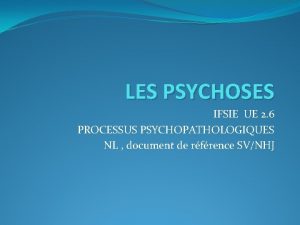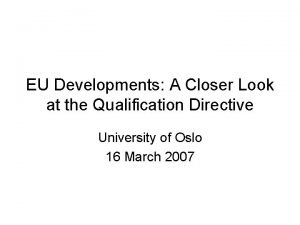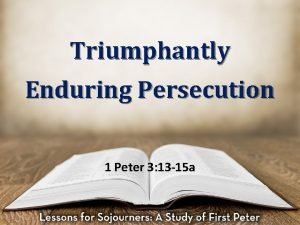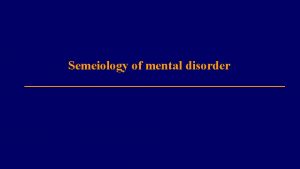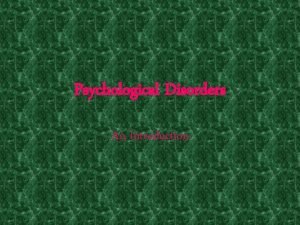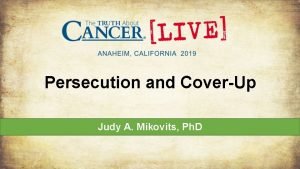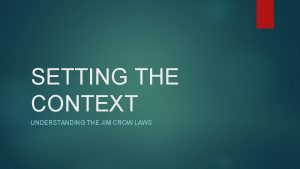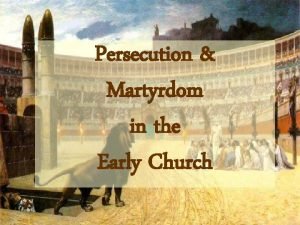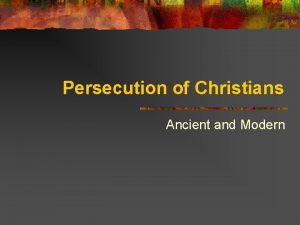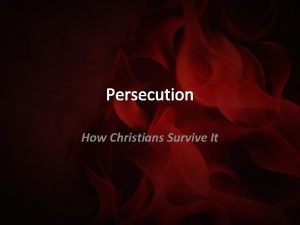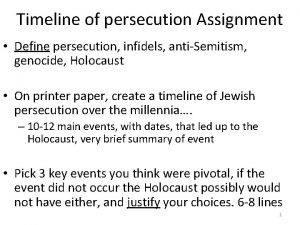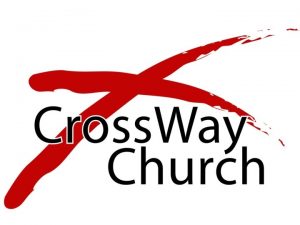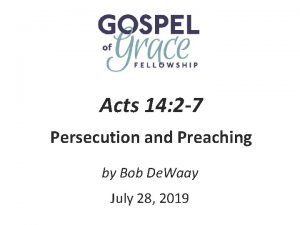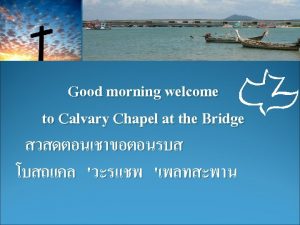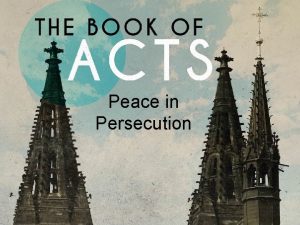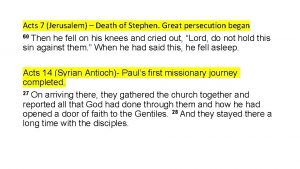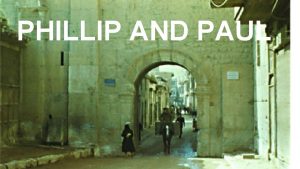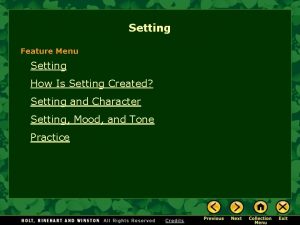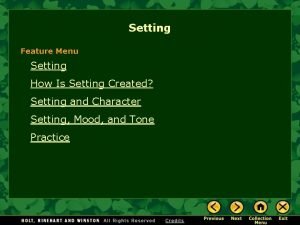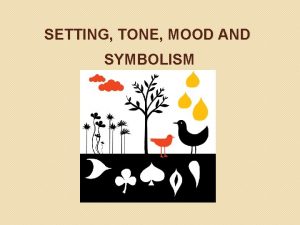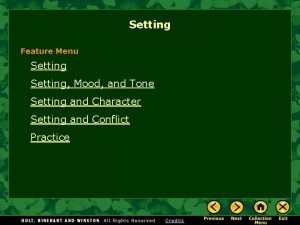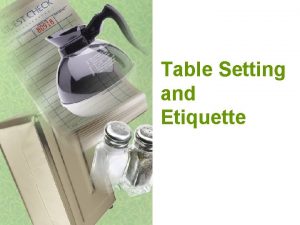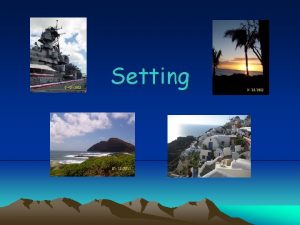Acts 4 The First Persecution Setting of Acts





























- Slides: 29

Acts 4 The First Persecution

Setting of Acts 4 ‣ Up to this point, there had been no resistance to the activity of the primal church on the part of the Jews. ‣ So far, there was a general acceptance and favor among the people. Each day more souls were being saved (2: 47). ‣ Peter and John were at the temple in Jerusalem for prayer. ‣ They exercise the power of the name of Jesus to heal a man who was lame from birth.

Setting of Acts 4 ‣ Peter preaches to the astonished crowd in the temple and attributed the miracle to faith in the name of Jesus. ‣ Peter calls for their repentance and connects the blessing of the Abrahamic Covenant by means of Jesus as Messiah.

Persecution begins ‣ The persecution of believers begins in Acts 4. ‣ Just as Jesus’ words in Nazareth were first well received (Luke 4: 20, 22), so were Peter’s (Acts 2: 37, 41, 47; 4: 4). ‣ In both cases, proclamation ultimately led to persecution. (Luke 4: 28 -29; Acts 4: 1 -2) ‣ In both cases, God’s servants remained safe. (Luke 4: 30; Acts 4: 21; 5: 19)

Persecution begins ‣ Persecution is a major theme in Acts, inseparable from the spreading of the Gospel, and sometimes connected with joy. ‣ Luke presents it as characteristic of the Christian life. (Luke 6: 22 -23; Acts 14: 22)

The Arrest of Peter & John (4: 1 -4) ‣ Peter’s sermon was interrupted. As always he was the spokesman, but the plural shows that John was not silent (“they were teaching. . . ”). Like all the apostles, he also was bearing his witness to Christ. ‣ The police action is taken by a group of people responsible for public order within the temple area. • priests on duty - those who administered daily sacrifices

The Arrest of Peter & John (4: 1 -4) • Captain of the temple guard = 2 nd rank next to High Priest, whose chief responsibility was to preserve order in the Temple.

The Arrest of Peter & John (4: 1 -4) • Sadducees The Sanhedrin maintained some police power, which the Romans tolerated. Because most ancient temples had wealth and often treasuries that functioned as banks, they typically also had watchmen and guards. The Jewish High Court / Council met in the mornings. Since it was evening, the two Apostles were placed in detention for the night.

The Sadducees ‣ One of three “schools of thought” in 1 st-century Judaism - Pharisees, Sadducees, and Essenes. ‣ The Sadducees did not themselves believe in a resurrection; most other Jews did, including the Pharisees. The Sadducees considered the concepts of demons and angels, immortality and resurrection as innovations, believing in no life beyond this life. ‣ They rejected the oral traditions of the Pharisees and considered only the written Torah of the Pentateuch as valid.

The Sadducees ‣ The Sadducees were upset with Peter’s preaching that in Jesus the general resurrection had begun, a message with definite messianic implications that was liable to be viewed by the Romans as revolutionary.

‣ They The Sadducees (cont. . . ) were the ruling class of wealthy aristocrats. Their concern was to collaborate with the Romans, preserve the status quo, and thus protect their own economic interests. ‣ In return the Romans accorded the Sadducees considerable power, appointing the high priest from their ranks, the most powerful political figure among the Jews in that day. ‣ They feared the subversive implications of the apostles’ teaching and thus saw the apostles as both agitators and heretics, disturbers of the peace and enemies of the truth.

The Sadducees (cont. . . ) ‣ Although the Pharisees were the group most opposed to Jesus during his ministry, in Acts the Sadducees have become the leaders of the opposition.

Report (4: 4) ‣ A brief. Church pause in. Growth the narrative to give a progress report on the spread of the gospel. ‣ 120 (Acts 1: 15); then 3, 000 (2: 41); now the men alone were about five thousand, suggesting a total number of believers in excess of 10, 000. ‣ The ultimate objective of all the activities (healing of the lame man, preaching to the crowds, suffering persecution) was to be witnesses in Jerusalem, Judea, Samaria, and the end of the earth. ‣ Luke assures his readers immediately that the opposition of men did not hinder the Word of God. The Sadducees could arrest the apostles,

EXCURSUS e∆pi… to; aujtov ‣ Did the event at the temple in Chapter 3 occur on the same day as Pentecost in Chapter 2? ‣ epi to auto = Usually translated “together” or “numbering”. ‣ Never translated “at the same time”. ‣ The phrase is found in most manuscripts at the end of chapter 2. A few variant manuscripts put the phrase at the beginning of chapter 3. ‣ Nevertheless, whether the number of believers grew from 120 to 5, 000 in a day or in a few months, the message of Luke is clear. Nothing was going to stop the spread of the gospel.

‣ The Sanhedrin - The Jewish supreme court (4: 5 -12) consisted. The of 71 Hearing members— 70 elders according to the pattern of Num. 11: 16 plus the high priest as presiding officer. ‣ It was dominated by the priestly Sadducees with a Pharisaic minority, represented mainly by the scribes (lawyers) of the court. ‣ Annas is designated as high priest (a title retained for life). He had served in that role earlier (A. D. 6 -15) and was the controlling figure in the high-priestly circle. ‣ His son-in-law Caiaphas was the official high priest at this time (A. D. 18 -36), and Annas’ son Jonathan (perhaps the one mentioned as John

“By what power or by what name did you do this? ” (4: 7) ‣ Only a few months earlier, these people met for the trial of Jesus. Now the name of Jesus resurfaces in a dramatic way. Killing Jesus had not stopped the movement. ‣ They were concerned about the source of the disciples’ teaching and the possibility that their emphasis on the resurrection could lead to a major messianic insurrection with serious political repercussions. ‣ They were concerned about authority, proper accreditation, law and order, keeping the peace.

Peter, filled with the all Holy ‣“Then Luke 21: 12 -15 12 “But before this, Spirit, they will seize yousaid and persecute you. (4: 8) They will hand to them. . . ” you over to synagogues and put you in prison, and you will be brought before kings and governors, and all on account of my name. 13 And so you will bear testimony to me. 14 But make up your mind not to worry beforehand how you will defend yourselves. 15 For I will give you words and wisdom that none of your adversaries will be able to resist or contradict. ‣ Luke 12: 11 -12 “When you are brought before synagogues, rulers and authorities, do not worry about how you will defend yourselves or

court. Peter’s Testimony (vv. 8 -12) ‣ The crowd in the temple wondered about the source of the lame man’s healing, and Peter pointed to the name of Jesus. The Sanhedrin wanted to know about the name, and Peter pointed them to the healing of the lame man. ‣ Peter accused the Jews in his two temple sermons (2: 23; 3: 15); he now accuses the Sanhedrin of their role in Jesus’ death, and the fact that God had raised him from the dead. ‣ That there was salvation in no other name was an implicit invitation to the Sanhedrin to place their faith in Jesus. It was Jesus’ name that brought physical deliverance to the lame man

The Cornerstone - Psalm 118: 22 ‣ “The stone the builders rejected has become the cornerstone; ” ‣ In Luke 20: 17, Jesus refers to this passage in reference to himself. ‣ It establishes the guilt of the Sanhedrin. They were the “builders, ” the leaders of the nation, who rejected the very rock (Jesus) on which God’s people are to be built. ‣ “Builders” - used in rabbinic writings for teachers, and in the Qumran writings it is used for leaders of the community.

‣ parrhsi√a (parresia) - “boldness”; an important “unschooled, men” (v. 13) word in Acts whichordinary depicts Spirit-inspired courage and confidence to speak in spite of any danger or threat (2: 29; 4: 29, 31; 28: 31). ‣ a˙gra◊mmatoi√ (agrammatoi) - unlearned, no proper training in Rabbinic theology, unschooled, ignorant; could mean illiterate, but these apostles did learn how to read and write. ‣ i∆diwÇtai (idiotai) - common, non-professional ‣ Jesus also lacked a formal theological education and professional status as a Rabbi, but also with an amazing boldness and knowledge beyond his training. (see John 7: 15)

‣ The council could see before their eyes the evidence of the healed cripple. He was Exhibit The Warning (4: 13 -22) A, a known sign. Everyone in the city knew that he had never walked in his life, but there he was standing with the apostles. ‣ They could not deny it and they would not acknowledge it. Embarrassed, they ordered them out of court, so that they could confer in private. ‣ How could Luke have known what went on in the Sanhedrin’s confidential discussion? Paul may have been there. More likely, Gamaliel was, and he could have told Paul later what happened.

Peterthe & leaders John’sof. Reply (vv. 19 -20) ‣ Though the council charged them not to speak or teach in the name of Jesus, Peter realized the impossibility of abiding by this prohibition. ‣ The response was much the same as that given by Socrates to his Athenian accusers who warned him to desist from his teaching. “I shall obey God rather than you. ” The saying had become quite proverbial, and was widely used by Jews and Greeks. ‣ Acts 5: 29 Peter and the other apostles replied: “We must obey God rather than human beings!” ‣ How does this affect our reading of Romans

‣ Here. The is the. Believers Christian koinonia in action. We Pray (4: 23 -31) have seen the apostles in the Council; now we see them in the church. Having been bold in witness, they were equally bold in prayer. ‣ Their first word was Despotes, “Sovereign Lord”, a term used of a slave owner and of a ruler of unchallengeable power. The Sanhedrin might utter warnings, threats and prohibitions, and try to silence the church, but their authority was subject to a higher authority still, and the edicts of men cannot overturn the decrees of God. ‣ Next we observe that, before the people came

The Believers Pray (4: 23 -31) ‣ 1. He is the God of creation. “You made” (v. 24). ‣ 2. He is the God of revelation. “You spoke” (v. 25). ‣ 3. He is the God of history. “You decided” (v. 28). ‣ He had caused even his enemies (Herod and Pilate, Gentiles and Jews, united in a conspiracy against Jesus, verse 27) to do what his power and will had decided beforehand.

The Believers Pray (4: 23 -31) ‣ Psalm 2: 1 -2 ‣ 1 Why do the nations conspire and the peoples plot in vain? 2 The kings of the earth rise up and the rulers band together against the Lord and against his anointed, ‣ The raging nations represented the Gentile rulers and their cohorts, the soldiers who executed Jesus. The people of Israel were those who plotted in vain. Herod represented the “kings of the earth”; Pilate, the “rulers”, and Christ, the “anointed” of God.

because: 1. It does pray for deliverance but for The not Believers Pray (4: 23 -31) boldness. 2. It gets to the heart of the reason for persecution – to silence the Church. 3. It views current events in the light of Scripture. 4. It has a very high view of the sovereignty of God. 5. It asks for not just a miracle but for a season of miracles. 6. It results in the place being physically shaken. 7. It results in Spirit-filled disciples giving bold witness with spectacular results (see later passages in chapters 4 & 5).

‣ They. The continued to own their goods, yet in heart Believers Share (4: 32 -37) and mind they cultivated an attitude so radical that they thought of their possessions as being available to help their needy sisters and brothers. Their radical attitude led to sacrificial action. ‣ The Jerusalem church did not lay down an obligatory model — a kind of primitive Christian ‘communism‘ — which God wants all Spiritfilled communities to copy. The fact that the selling and giving were voluntary is enough to dispose of this. What we should surely do, instead, is to note and seek to imitate the care of the needy and the sacrificial generosity

‣ Luke. The stresses Jesus’ Share teaching(4: 32 -37) that the gospel Believers of the kingdom was good news for the poor (Lk. 4: 18 -19; 6: 20; 7: 22). But how could it be so unless it offered them justice as well as salvation, the abolition of their poverty as well as the remission of their sins? ‣ Luke 4: 18 -19 “The Spirit of the Lord is on me, because he has anointed me to proclaim good news to the poor. He has sent me to proclaim freedom for the prisoners and recovery of sight for the blind, to set the oppressed free,

‣ Two contrasting examples: 1. Barnabas - generosity and openness Example of Barnabas (4: 36 -37) 2. Ananias and Sapphira - greed and hypocrisy ‣ ‘Barnabas’ (Son of Encouragement) - the fitting nickname which the apostles gave, on account of his helpfulness, to Joseph, a Levite from Cyprus. ‣ He is a major character in later chapters. He was Paul’s companion on his first mission which began on Cyprus (13: 4 b-6). He introduced the newly converted Paul to the apostolic circle when everyone else was suspicious of him (9: 27). He brought Paul to Antioch to participate in the outreach to the Gentiles (11: 25 -26). And he stood up for the
 Hyperhédonie
Hyperhédonie Délire de persécution
Délire de persécution Ifsie
Ifsie Persecution meaning
Persecution meaning 1 peter 3:13-15
1 peter 3:13-15 Oneiroid state
Oneiroid state Fugue state meaning
Fugue state meaning Marc inc judy mikovits
Marc inc judy mikovits Understanding jim crow (setting the setting)
Understanding jim crow (setting the setting) Hát kết hợp bộ gõ cơ thể
Hát kết hợp bộ gõ cơ thể Ng-html
Ng-html Bổ thể
Bổ thể Tỉ lệ cơ thể trẻ em
Tỉ lệ cơ thể trẻ em Chó sói
Chó sói Tư thế worms-breton
Tư thế worms-breton Chúa yêu trần thế
Chúa yêu trần thế Môn thể thao bắt đầu bằng chữ đua
Môn thể thao bắt đầu bằng chữ đua Thế nào là hệ số cao nhất
Thế nào là hệ số cao nhất Các châu lục và đại dương trên thế giới
Các châu lục và đại dương trên thế giới Công thức tính thế năng
Công thức tính thế năng Trời xanh đây là của chúng ta thể thơ
Trời xanh đây là của chúng ta thể thơ Mật thư tọa độ 5x5
Mật thư tọa độ 5x5 Phép trừ bù
Phép trừ bù Phản ứng thế ankan
Phản ứng thế ankan Các châu lục và đại dương trên thế giới
Các châu lục và đại dương trên thế giới Thể thơ truyền thống
Thể thơ truyền thống Quá trình desamine hóa có thể tạo ra
Quá trình desamine hóa có thể tạo ra Một số thể thơ truyền thống
Một số thể thơ truyền thống Bàn tay mà dây bẩn
Bàn tay mà dây bẩn Vẽ hình chiếu vuông góc của vật thể sau
Vẽ hình chiếu vuông góc của vật thể sau


